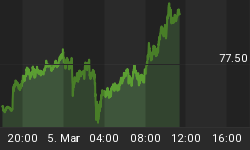In a recent conversation with a fellow gold analyst, he was emphatic that the price one pays for physical gold should be ignored. "What's far more important," he insisted, "is how many ounces I own in relation to the total value of my assets."
Building a core position in gold bullion is a smart goal, to be sure, and a strategy Casey Research has been advising for years. However, ignoring the price you pay for gold could be seen as foolhardy; sure, it's insurance, but isn't price part of the consideration when you shop for insurance?
So, who's right?
The World Gold Council just released their 2009 annual report on gold trends. From the densely populated pages of interesting data, there's one compelling tidbit I gleaned that may shed some light on the buying behavior of gold investors.
Overall investment in gold was 7% higher in 2009 than 2008. This is significant when you consider that demand in the fourth quarter of 2008 - during one of the worst financial meltdowns in history - was so great that shortages of physical metal abounded everywhere. And yet investors bought more gold in 2009 when investor fear about global financial uncertainty was subdued.
Further, 2009 total funds invested in all forms of gold exceeded 2008 by 20%, and the average price was 11.6% higher. In other words, investors were buying gold even though the price wasn't necessarily "low." To be sure, that's a broad statement. But the fact remains that year-on-year, more gold was purchased at higher prices when the markets were less scary, than when the price was lower and Hank Paulson was on CNBC every 15 minutes pontificating on how to save America's financial system.
This isn't to suggest one shouldn't pay attention to price. And the data doesn't identify how many of those who purchased gold last year were first-time buyers, as certainly there were newcomers to the sector that contributed to higher demand. But it begs the question, who would continue to buy gold when the price is higher?
Whoever doesn't own enough, that's who. The gold I bought last month was certainly higher priced than what I paid in 2008. But I'm trying to position my assets for protection from eventual dollar debasement and rising inflation. So perhaps focusing more on acquiring sufficient ounces to withstand a storm rather than stubbornly buying none, waiting for "cheaper" prices, however you define that, is a better mindset. Not owning enough gold is equivalent to holding a million-dollar mortgage and having a $10,000 life insurance policy. It won't help much when you really need it.
Of course we should pay attention to price. But the trick is not letting that distract you from buying what you need. You're not buying gold bullion as a speculation (although we expect to make a bundle on our holdings), but as a sound form of cash in an environment where government has no respect for a balance sheet and sees inflation as the only way out of its black hole of debt. During periods of inflation, the government does fine; it's the citizens that suffer from the lost purchasing power of their savings. It's clear our currency is being debased. What's your plan of defense?
For those diligently accumulating gold, how do you know when you have enough? Check your anxiety quotient. If Ben continues printing money or Obama promises more goodies than he has the money to pay for, and you remain calm, then you likely have adequate gold. These are the investors who can afford to be stubborn about price as they build their holdings. In my opinion, this is where we all want to be.
What form of gold should you buy? It depends on why you're buying it. If you understand gold's role in history, owning a physical form will come naturally to you. If you see the threat of inflation on the horizon, or you worry about what is being done to the dollar, you'll own both coins and an ETF. If you're worried about possible exchange controls someday, you'll consider a Perth Mint Certificate. And the more gloomy your outlook about the global economy, the greater the percentage of all forms of gold you'll buy.
That said, we maintain a bias toward physical ownership. GLD and other gold ETFs are fine and do offer protection. But the custodian isn't going to airmail gold to you when you cash in your shares; having the "hard money" in your hand gives you the freedom an ETF cannot. In our book, owning physical gold, in the form of one-ounce coins, is where your first dollar should go.
I remember when my wife and I decided it was time to get life insurance. We just had our kids, and it was time to play grown-up. Given what 5,000 years of history has taught us about the value of gold, and given what's happening at this moment in history to our currency, are you playing grown-up with your investments?
Is the current price of gold a good time to buy? Check out our four "clues" in the new issue of Casey's Gold & Resource Report, risk-free here...
















